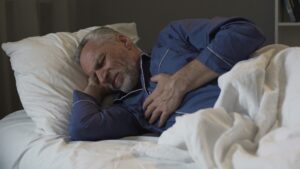
A new study shows that people who suffer from insomnia or get too much sleep are more likely to have a heart attack than those who get a good night’s sleep.
The study showed that people with insomnia were 69 percent more likely to have a heart attack than those without the sleep disorder. The rates were even higher in people who had diabetes and insomnia.
Insomnia puts stress on the body, which triggers the release of the stress hormone cortisol and can accelerate atherosclerosis. Atherosclerosis refers to the plaque that accumulates in arteries that can create conditions for a heart attack.
The study was published in Clinical Cardiology in late February. It featured data from 1,200 studies that featured nearly 1.2 million adults. Of them, nearly 13 percent (154,000) had insomnia, and most did not have a history of a heart attack.
After nine years of follow-up, about 2,400 people with insomnia and almost 12,400 without insomnia had a heart attack. People who slept five or fewer hours per night seemed to have the most significant heart attack risk.
Too much sleep was not good, either. People who slept six hours or less had a lower risk of heart attack than those who slept nine hours. Too much sleep may indicate poor quality sleep or be the body’s response to another health condition.
Seniors with insomnia were more than twice as likely to have heart attacks as their counterparts without it.
The ability to fall and stay asleep for 6-8 hours is ideal. Creating a sleep schedule with consistent bed and wake times and creating an environment conducive to sleep and relaxing before bed can all help make it easier to get good sleep.
It’s a good idea to speak with a sleep specialist if you consistently struggle to fall and stay asleep.